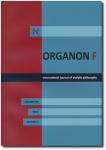Expressive Completeness in Brandom’s Making It Explicit
Expressive Completeness in Brandom’s Making It Explicit
Author(s): Radek OcelákSubject(s): Logic, Pragmatism, Philosophy of Language
Published by: Filozofický ústav SAV
Keywords: Expressive completeness; normative pragmatism; Robert Brandom; self-referentiality; theory of meaning;
Summary/Abstract: In this paper, I focus on the notion of expressive completeness in Robert Brandom’s Making It Explicit. For Brandom as a normative pragmatist, a theory of meaning is expressively complete if it specifies a human practice that is sufficient to confer on expressions conceptual contents so rich that the very conferring practice can be described by means of these expressions. I put the notion of expressive completeness in contrast with the related, but non-identical notion of self-referentiality of a semantic theory. Further, I examine the position of the concept in Brandom’s philosophical project: I assess the justification Brandom provides for his claim of expressive complete-ness of the presented theory, and I outline the consequences he can draw for his overall project provided that expressive completeness is achieved. Whether it is actually achieved, remains however an open question.
Journal: Organon F
- Issue Year: 21/2014
- Issue No: 3
- Page Range: 327-337
- Page Count: 11
- Language: English

